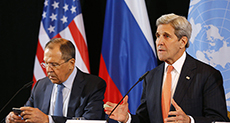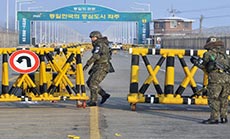
August 14 2007, Lebanese mark Divine victory
Source: Al-Manar TV, 14-8-2007
This is south Lebanon, or as many may call it, the mountain of Amel. Throughout history the people of this land have been facing up invaders; "Israel" was the last of them. When the Lebanese resistance forced out "Israeli" occupation forces from this country in the year 2000, after 22 years of occupation, it had in sight the objective of releasing dozens of Lebanese detainees still suffering in "Israeli" jails. On the 12th of July 2006, the Islamic Resistance captured two "Israeli" soldiers near the border with occupied Palestine and killed 8 other soldiers. Their operation was dubbed "The Sincere promise," after Hizbullah Secretary General Sayyed Hasan Nasrallah`s public pledges over the prior year and a half to capture "Israeli" soldiers and swap them for Lebanese detainees still suffering in "Israeli" jails. The operation sped up the execution of what was later known as a covert US-"Israeli" plot to wage war on Lebanon and crush Hizbullah once and for all. Everyone here had believed that the next "Israeli" aggression against them was just a matter of time. They were not mistaken.
One year has passed on the end of the war that saw more than 1,300 people killed, one third of whom are children and over 4000 other people were injured. The casualty figures continue to rise after the end of hostilities took effect on August 14, due to "Israeli" unexploded cluster bombs, the use of which according to international law is prohibited in populated areas. 130,000 homes have been destroyed or damaged across the country, mainly in the south, the southern suburb of Beirut and the Bekaa Valley. "Israel" said it wanted to destroy Hizbullah and its capabilities. But that was only the announced objective.
Amine Hoteit, retired Lebanese Army Brigadier General explained that one of the main objectives of the war, was to destroy the notion of resistance. He said that there was a plot to transfer the displaced southerners from Beirut to northern Lebanon, and perhaps in another phase, to outside Lebanon. The aim, according to Hoteit, is to empty the southern sector of the Litani River from the resistance community facing "Israel".
When the end of hostilities took effect at 8:00 am local time on the 14 of August, hundreds of thousands of people had been already on their way to their devastated towns, after Hizbullah Secretary General Sayyed Hasan Nasrallah and House Speaker Nabih Berri urged them to return to their homes, even if they have to sleep on the ruins of their homes. This constituted another blow to the US-"Israeli", and unfortunately some Lebanese powers` plot to change the demographic scene in southern Lebanon, for the sake of preserving "Israel`s" security.
Despite the massive destruction, massacres and the environmental catastrophe caused by the "Israeli" aggression, the balance sheet of the second Lebanon War certainly did not point to an "Israeli" Army victory, particularly after the first week of the war. Hizbullah`s fire power, particularly its long, medium and short range missiles maintained high efficiency and gradually targeted "Israeli" settlements from northern occupied lands southwards, even threatening Tel Aviv. "Israel`s" air force bank of targets dried out and the military command refrained from authorizing a land operation arguing that its soldiers were ill prepared. When the uncoordinated military command ultimately chose to launch a land operation, its soldiers and heavily protected and sophisticated Merkava tanks were dealt a serious blow in the Valley of Hojeir, the plain of Khiam, Taybeh and Odaissa, at a time resistance fighters were engaged in a fierce house to house battle in Ayta Al-Shaab; the town which still haunts "Israeli" soldiers.
"Israel" unpleasantly admitted the fact that its army did not achieve victory, not only because of the failed conduct of its leaders, but rather, because Hizbullah, according to the "Israelis" themselves, was more effective and determined. Despite of Washington`s firm objection, the "Israeli" leadership sought a ceasefire without delay.
On the 11th of July, The UN Security Council determined that the situation in Lebanon constitutes a threat to international peace and security. It adopted resolution 1701 that demanded a full cessation of hostilities in Lebanon. The resolution demanded "Israel" to withdraw all of its forces from Lebanon in parallel with Lebanese and UNIFIL soldiers deploying throughout the South. It banned sales or supply of arms and related materiel to Lebanon except what its Government authorizes. 1701 also demanded provision to the United Nations of all remaining maps of land mines in Lebanon in "Israel's" possession; something that did not yet
As hostilities were put to an end, Hizbullah announced victory and Sayyed Nasrallah dedicated the Divine victory to resistance fighters, martyrs, their families, the detainees, and the resistant society.
In the meantime, reconstruction is underway with pledges by many countries to rebuild devastated homes, schools, hospitals, bridges, highways and whole towns and villages. They want to make it a better place for the people whose steadfastness played a significant role in defeating "Israel" at a time the region is sitting on top of a volcano crater.
What took effect on the 14th of August of last year was not a ceasefire but rather an end to 34 days of hostilities. Hence, is the door for another "Israeli" war against this country still open? There are indications that the whole region is unstable, and Lebanon is not an exception, for here, in south Lebanon, is where the story never ends.

Kerry to Hold Fresh Talks with Russia on Syria
8 years ago
All but 4 Nations are Subject to NSA’s Espionage
10 years ago
Koreas Agree to Re-open Kaesong Industrial Zone
11 years ago